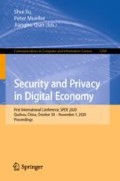Abstract
Key reconciliation protocols are critical components to deploy secure cryptographic primitives in practical applications. In this paper, we demonstrate on these new requirements and try to explore a new design routine in solving the key reconciliation problem in large scale p2p networks with automatic intelligent end user under the notion of evolvable cryptography. We design a new evolvable key reconciliation mechanism (KRM) based on two tricks for the AI user: the observation of shared beacons to evolve based on a deep auto-encoder, and the exchange of observed features as a hint to reconcile a shared key based on a deep paired decoder. For any passive adversary, the KRM is forward provable secure under the linear decoding hardness assumption. Compared with existing schemes, the performance evaluation showed our KRM is practical and quite efficient in communication and time costs, especially in multi-party scenarios.
Supported by the National Natural Science Foundation of China (No. 61572521, U1636114), National Key Project of Research and Development Plan (2017YFB0802000), Innovative Research Team Project of Engineering University of APF (KYTD201805), Fundamental Research Project of Engineering University of APF (WJY201910).
Access this chapter
Tax calculation will be finalised at checkout
Purchases are for personal use only
References
Abadi, M., Andersen, D.G.: Learning to protect communications with adversarial neural cryptography. arXiv preprint arXiv:1610.06918 (2016)
Alagic, G., et al.: Status report on the first round of the NIST post-quantum cryptography standardization process. US Department of Commerce, National Institute of Standards and Technology (2019)
Alkim, E., et al.: Newhope-algorithm specifications and supporting documentation. Second Round NIST PQC Project Submission Document (2019)
Alkim, E., Ducas, L., Pöppelmann, T., Schwabe, P.: Post-quantum key exchange-a new hope. In: 25th \(\{\)USENIX\(\}\) Security Symposium (\(\{\)USENIX\(\}\) Security 2016), pp. 327–343 (2016)
Bos, J., Costello, C., Ducas, L., et al.: Frodo: take off the ring! practical, quantum-secure key exchange from LWE. In: Proceedings of the 2016 ACM SIGSAC Conference on Computer and Communications Security, pp. 1006–1018 (2016)
Bos, J., et al.: CRYSTALS-Kyber: a CCA-secure module-lattice-based KEM. In: 2018 IEEE European Symposium on Security and Privacy (EuroS&P), pp. 353–367. IEEE (2018)
Bos, J.W., Costello, C., Naehrig, M., Stebila, D.: Post-quantum key exchange for the TLS protocol from the ring learning with errors problem. In: 2015 IEEE Symposium on Security and Privacy, pp. 553–570. IEEE (2015)
Ding, J.: New cryptographic constructions using generalized learning with errors problem. IACR Cryptology ePrint Archive, 2012:387 (2012)
Ding, J., Takagi, T., Gao, X., Wang, Y.: Ding key exchange. Technical report, National Institute of Standards and Technology (2017)
Dudzik, M., Drapik, S., Prusak, J.: Approximation of overloads for a selected tram traction substation using artificial neural networks. Technical Transactions (2016)
Fujisaki, E., Okamoto, T.: Secure integration of asymmetric and symmetric encryption schemes. In: Wiener, M. (ed.) CRYPTO 1999. LNCS, vol. 1666, pp. 537–554. Springer, Heidelberg (1999). https://doi.org/10.1007/3-540-48405-1_34
Goodfellow, I., et al.: Generative adversarial nets. In: Advances in Neural Information Processing Systems, pp. 2672–2680 (2014)
Jiang, H., Zhang, Z., Chen, L., Wang, H., Ma, Z.: IND-CCA-secure key encapsulation mechanism in the quantum random oracle model, revisited. In: Shacham, H., Boldyreva, A. (eds.) CRYPTO 2018. LNCS, vol. 10993, pp. 96–125. Springer, Cham (2018). https://doi.org/10.1007/978-3-319-96878-0_4
Klimov, A., Mityagin, A., Shamir, A.: Analysis of neural cryptography. In: Zheng, Y. (ed.) ASIACRYPT 2002. LNCS, vol. 2501, pp. 288–298. Springer, Heidelberg (2002). https://doi.org/10.1007/3-540-36178-2_18
Kusner, M.J., Hernández-Lobato, J.M.: GANS for sequences of discrete elements with the Gumbel-Softmax distribution. arXiv preprint arXiv:1611.04051 (2016)
Zhou, L., Chen, J., Zhang, Y., Su, C., James, M.A.: Security analysis and new models on the intelligent symmetric key encryption. Comput. Secur. 25, 14–24 (2019)
Maurer, U.M., Wolf, S.: The Diffie-Hellman protocol. Des. Codes Crypt. 19(2–3), 147–171 (2000)
Mislovaty, R., Klein, E., Kanter, I., Kinzel, W.: Security of neural cryptography. In: Proceedings of the 2004 11th IEEE International Conference on Electronics, Circuits and Systems, ICECS 2004, pp. 219–221. IEEE (2004)
Peikert, C.: Lattice cryptography for the internet. In: Mosca, M. (ed.) PQCrypto 2014. LNCS, vol. 8772, pp. 197–219. Springer, Cham (2014). https://doi.org/10.1007/978-3-319-11659-4_12
Rivest, R.L.: Cryptography and machine learning. In: Imai, H., Rivest, R.L., Matsumoto, T. (eds.) ASIACRYPT 1991. LNCS, vol. 739, pp. 427–439. Springer, Heidelberg (1993). https://doi.org/10.1007/3-540-57332-1_36
Ruttor, A.: Neural synchronization and cryptography. arXiv preprint arXiv:0711.2411 (2007)
Smith III, T.J., Rai, V.R., Collins, B.M.: Creating and utilizing black keys for the transport layer security (TLS) handshake protocol and method therefor. US Patent App. 15/738,567, 5 July 2018
Zhang, J., Zhang, Z., Ding, J., Snook, M., Dagdelen, Ö.: Authenticated key exchange from ideal lattices. In: Oswald, E., Fischlin, M. (eds.) EUROCRYPT 2015. LNCS, vol. 9057, pp. 719–751. Springer, Heidelberg (2015). https://doi.org/10.1007/978-3-662-46803-6_24
Author information
Authors and Affiliations
Corresponding author
Editor information
Editors and Affiliations
Rights and permissions
Copyright information
© 2020 Springer Nature Singapore Pte Ltd.
About this paper
Cite this paper
Zhu, S., Han, Y., Yang, X., Wu, X. (2020). Efficient and Evolvable Key Reconciliation Mechanism in Multi-party Networks Based on Automatic Learning Structure. In: Yu, S., Mueller, P., Qian, J. (eds) Security and Privacy in Digital Economy. SPDE 2020. Communications in Computer and Information Science, vol 1268. Springer, Singapore. https://doi.org/10.1007/978-981-15-9129-7_7
Download citation
DOI: https://doi.org/10.1007/978-981-15-9129-7_7
Published:
Publisher Name: Springer, Singapore
Print ISBN: 978-981-15-9128-0
Online ISBN: 978-981-15-9129-7
eBook Packages: Computer ScienceComputer Science (R0)

